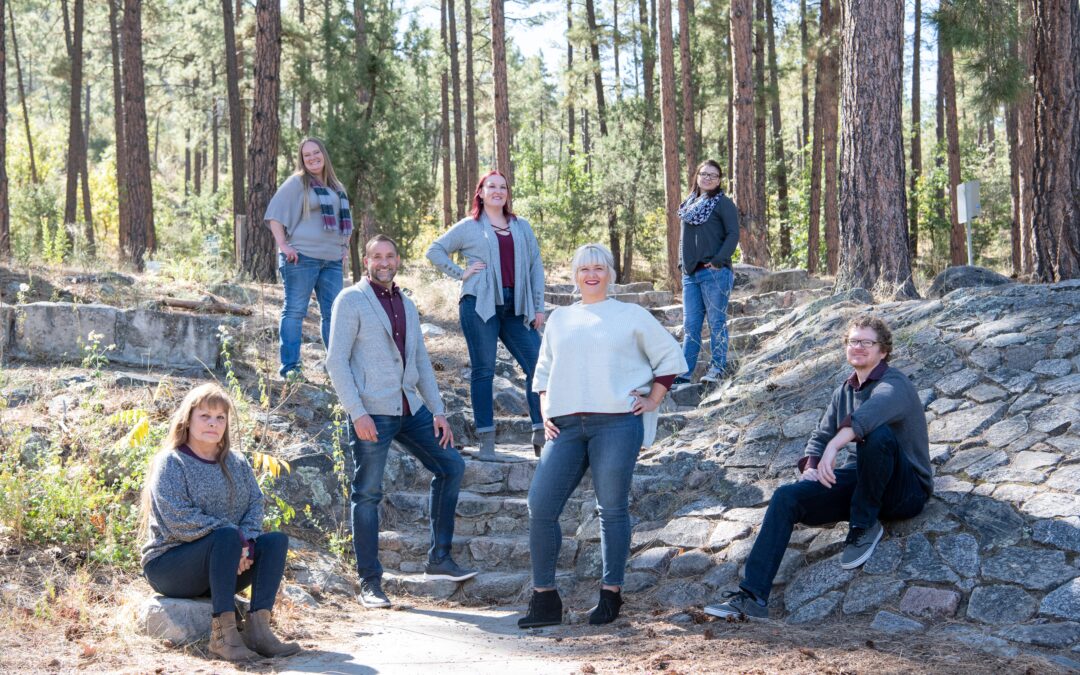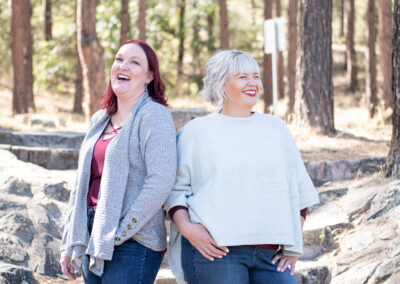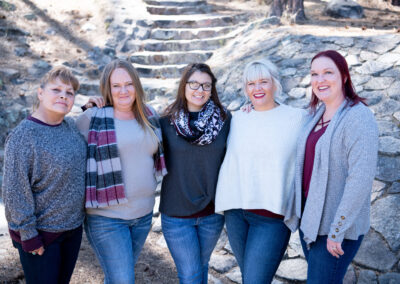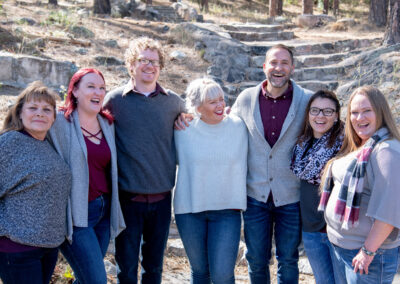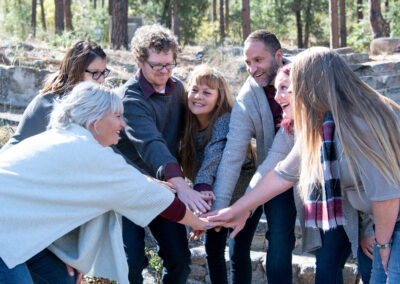The Coalition for Compassion and Justice Strives to End Homelessness by Developing Unique Solutions that Empower People to Step Up
By Hilary Dartt
The mission to end homelessness is a big one. Fortunately, the five women and two men who run the Coalition for Compassion and Justice (CCJ) specialize in big ideas.
The CCJ’s most challenging efforts lie in creating more housing and in empowering clients to step out of homelessness and become self-sustainable. Executive Director Jessi Hans said CCJ’s goal is to empty its emergency shelter and provide a variety of unique solutions, including RV parks, lodges, and cottages.
Although the CCJ emergency shelter is wonderful and fills a present need, she said, “We can do better. There are better, housing first solutions and that’s what we are pushing.”
Over the next year, Jessi said, the CCJ leadership team plans to transition into much larger projects; for example, they’d like to create an entire RV and mobile park rather than several single-home units. This, she said, will give CCJ “a much larger and longer-term plan … We want to continue to allow for incremental growth, so they can transition from lower monthly payments on up, so they feel like there’s a stairstep out of homelessness.”
The CCJ team hopes that by creating and testing different prototypes, they will come up with a model that any organization in the country can use to end homelessness locally.
Being better is one major component of developing better solutions.
“My leadership team provides me with the motivation to see the bigger picture,” said Betty Likens, CCJ’s Thrift Store Manager.
That goes for the whole team, Jessi said: “We’re always pushing ourselves to be better tomorrow than we are today—in every facet of life. I’m never going to stop growing. This team isn’t satisfied with being stagnant either. And when our clients come to us, they get a sense of that. We are also on a journey. We are pushing ourselves to the best version of us, and we are instilling that in our clients—asking them, ‘What is the life you want? How do we assist you in getting there?’”
“The process of constant growth comes from questioning our solutions. Are we doing our very best and what is next?” Jessi said. “We believe that you can’t fail if you don’t quit, so we can take on ideas that are complex and creative. We just keep figuring out the next step.”
“As I approach almost two years with CCJ,” said Amy Marshall, the “Stagger Straight Shelter Supervisor,” “I have not only gained an incredible amount of knowledge, but also self-awareness and growth that come from the direction and ideas of our team. To be the very best version of myself simply allows for our clients to get real and honest answers they deserve and need, in order to move forward and out of homelessness.”
Tasha Rosander, Finance Manager, said, “Being a part of a management team that relates to the clients and walks beside each individual to find a solution that works best for our clients makes working with this team amazing.”
Outside of the organization’s work, Jessi said, cultivating a work environment conducive to big ideas—the kind of ideas that produce solutions to big problems—is of the utmost importance.
“In order to get big ideas, you have to have the ability to be vulnerable,” Jessi said. “There has to be this ability to be raw, to dream, to think with boldness … if we can bring the fullest versions of ourselves to the table, the conversations about what we are doing, and what we want to do are going to be really robust. They’re going to create this synergy that makes us unstoppable when we put our minds to something.”
Allison Lenocker, Assistant Director, echoed Jessi’s thoughts: “At CCJ there is no fear of thinking big. We are not scared of big, intense ideas,” she joked. “Each one of us has a voice and the staff culture promotes using that voice to share ideas. No one ever feels dismissed after sharing which I think is how we come up with great things!”
CCJ “is such an empowering place to work,” said Advocate Jared Romig. “I’m surrounded by such amazing people who allow me to provide services for my clients and make decisions without having to get approval through many different channels. I am fortunate to have a place of work where I feel like my opinions matter but to also have the full support from this amazing team. It’s such a huge blessing for me and the clients I serve.”
Big ideas and big solutions require agility and fast action; two things that are easier in an organization not tied down by bureaucracy.
“We are anti-bureaucratic, which allows us to be agile and fluid,” Jessi said. “If there’s a need in the community that consistently comes up, we can create a program. We can make a decision to meet someone’s need today.”
Cameron Lenocker, Facilities Manager, said this job is unlike any other because it depends on reaction to need. He said that the lack of bureaucracy allows CCJ to meet needs in a timely fashion, and Betty said, “I’m free to respond to client needs without all the complex, multilayered systems and procedures.”
Jessi said people rely on CCJ’s ability to remain fluid, because the organization can usually help someone right away, or refer that person to an organization that can.
“I feel that bureaucracy is born out of lack of trust,” Allison said, offering this example: “Bureaucracy would be like if you gave me five dollars and asked me to get you a burger. When I come back, you ask me how fast I drove to get the burger, what the wind speed was while I was driving, who took the order, and could I please give you a triplicate of my receipt.”
“We [at CCJ] are anti-bureaucracy because we want to do what we know is right by our clients without having to jump through hoops just to prove we did it,” she said. “Our donors and our community trust that we are doing what we say we are and therefore we don’t waste time and resources on the bureaucratic process.”
Jessi has one other mission, secondary to the work of ending homelessness: to push the needle when it comes to what people think of nonprofits.
“I believe nonprofits should be seen as a business that does nonprofit work,” she said. “The wages and benefits should be competitive. We are a business.”
Currently, the CCJ headquarters is being renovated. “We’ve been working in open spaces with very little privacy, and that’s no way to treat our clients or staff members. Our new renovation will make sure our clients have dignity and that they feel secure. We also want to be able to provide our staff with living wages and excellent benefits. We’re building CCJ up to be a model for other nonprofit businesses and how they’re viewed.”
“We do some of the most important work. Why would we settle for less than a business that makes a gadget you’ll throw away next year, when what we’re doing is life-transforming?”
To learn more, visit http://yavapaiccj.org/ or call 928.445.8382.

